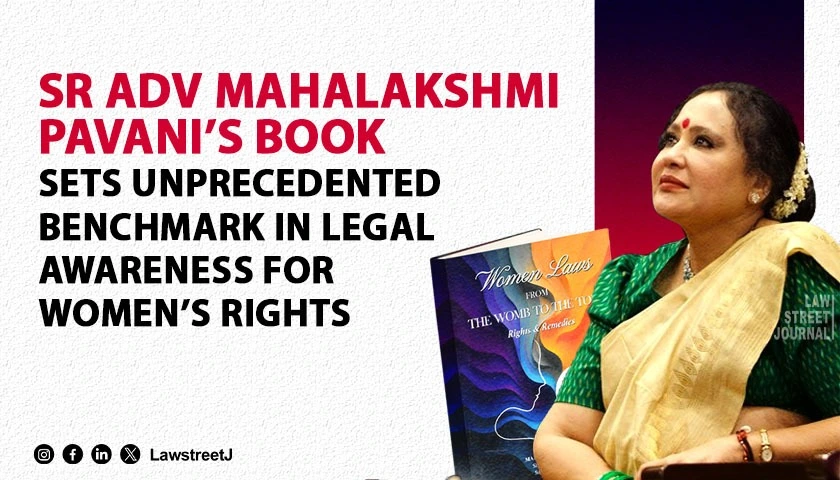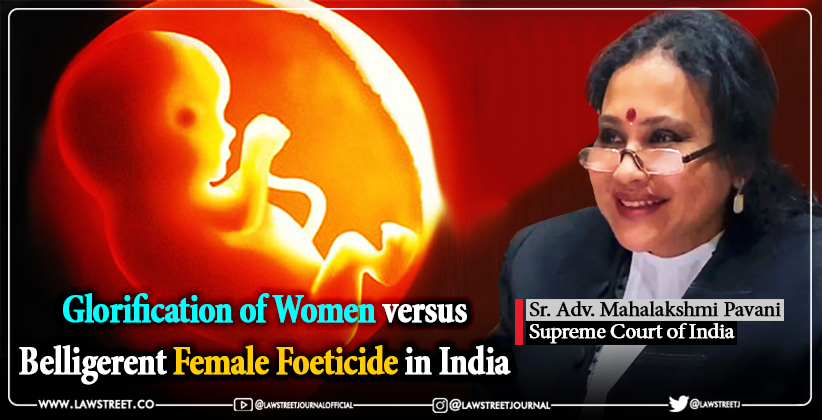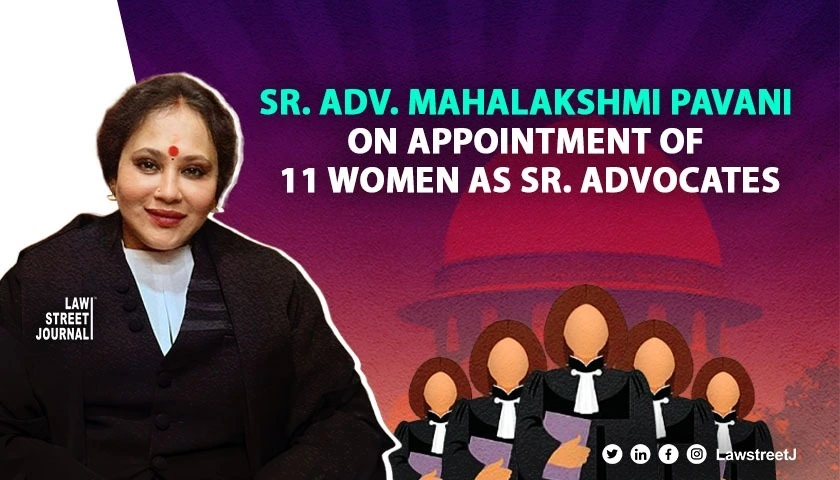New Delhi: Marking a historic chapter in India’s pursuit of gender justice, Senior Advocate Mahalakshmi Pavani launched her groundbreaking book, “Women Laws – From the Womb to the Tomb: Rights and Remedies”, at a momentous event held at the India International Centre, New Delhi.
The evening was graced by the distinguished presence of Hon’ble Justice B.V. Nagarathna and Hon’ble Justice K.V. Viswanathan, Judges of the Supreme Court of India, and Justice Hima Kohli, Former Judge of the Supreme Court. Their participation underscored the judiciary’s deepening commitment to the constitutional vision of gender equality.
Senior advocate Mahalakshmi Pavani’s seminal work, authored with profound legal insight and social sensitivity, charts the journey of a woman’s rights from birth to old age. It addresses critical legal issues like female foeticide, bride trafficking, sexual harassment at the workplace, adoption, surrogacy, cross-border child custody, and women’s property rights, offering readers a comprehensive understanding of the complex legal landscape women navigate today. The book carries a foreword by Hon’ble Justice M.N. Venkatachaliah, former Chief Justice of India, adding an authoritative voice to its pages.
In a powerful and inspiring address, Justice B.V. Nagarathna articulated that the ongoing shift in professions traditionally dominated by men is not about women entering alien spaces, but about dismantling unjust barriers that kept them away for generations. She beautifully captured this transformation by stating, “What is happening today is not about women invading men’s spaces, but rather dismantling barriers that have unfairly excluded them for generations. Every woman stepping into a courtroom, legislature or boardroom today isn’t expanding her boundaries. She is reclaiming her fair share of this nation’s intellectual and institutional legacy.”
Justice Nagarathna emphasized the importance of how language shapes perceptions, pointing out that terms like “women entering the judiciary” or “claiming a seat in the boardroom” subtly imply that these spaces were never meant for women. She urged that society must consciously shift its language to be more respectful and inclusive, saying, “It is important to pause and consider the words we use to describe these shifts. We frequently hear phrases like women entering the judiciary, claiming a seat in the board room or making their way into fields of power and influence. On deeper examination, however, they subtly suggest that these spaces were not meant for women, that their presence is unusual or even intrusive.”
Digging deeper into the roots of such notions, she observed that they stem from outdated beliefs that positioned decision-making and leadership as male prerogatives, remarking, “There is a loud but subtle declaration that portrays women as outsiders rather than rightful participants. This kind of language is not just old-fashioned. It is fundamentally inaccurate.”
Justice Nagarathna reaffirmed the rightful place of women in all sectors by powerfully asserting, “I would like to highlight that women are not intruding. They are not taking over or stepping into someone else’s territory. They are citizens, contributors, thinkers and leaders in their own right.” She further emphasized that empowering women, especially within their families, is crucial for India’s progress. Reflecting on the protections provided by Indian law, she posed a critical question, “Indian law today provides a lattice of protections and rights to women at every stage of life, but how far are those remedies available to her?”
Addressing the delicate issue of legal misuse, Justice Nagarathna pointed out the potential abuse of provisions like Section 498A IPC, warning that misuse can erode faith in genuine claims. She reminded that it is the judiciary’s solemn duty to carefully discern truth from manipulation in such cases.
Speaking highly of Senior advocate Mahalakshmi Pavani’s book, Justice Nagarathna praised its rich structure and its ability to illuminate not only the statutes but also the underlying legislative and judicial philosophies. She said, “The meticulously curated structure and constituent articles of the book not only enumerate the positive description of law, but also expound the intent of the legislator, the judicial intent and the constant and contextual societal setting in which these laws operate.”
Supreme Court Judge, Justice K.V. Viswanathan, in his address, reminded the audience that the contributions of women have profoundly enriched fields that were once considered male bastions. Appreciating the progress society has made, he stated, “It is undeniable that the stunning achievements of science, technology, arts and culture world over would have been impossible without the creative contribution of women.” Justice Viswanathan lauded the book for its expansive and insightful coverage of the legal issues women face. He found it both enlightening and engaging, recommending it strongly to both legal professionals and women across the country. As he noted, “It is a book which should adorn the library of every member of the legal fraternity. It should be possessed by every woman so that they are aware of their rights and how to enforce them.”
Justice Hima Kohli, Former Judge of the Supreme Court, delivered a deeply reflective and powerful address during the launch, emphasizing the indispensable role of legal literature in bridging the gap between the judiciary and the general public—particularly women. Highlighting that the complexity of law often alienates those it is meant to serve, she noted that the problem lies not in the absence of rights but in the widespread lack of awareness. It is this void, she said, that “the book finds its calling. It does not merely recite legal provisions. It contextualizes them, humanizes them, and most important, demystifies them.” Commending Mahalakshmi Pavani’s distinguished career and achievements, Justice Kohli described the book as a culmination of a journey committed to women’s empowerment and legal access, calling it “a statement of purpose… the voice of someone who has seen firsthand how the law can uplift and how often it fails to reach the very people that it was designed to protect.”
Justice Kohli praised the book’s exhaustive yet accessible nature, noting its unique ability to speak to lawyers, students, policymakers, activists, and ordinary citizens alike. With over 25 carefully curated chapters, the book traverses critical issues such as reproductive rights, domestic violence, surrogacy, adoption, and female foeticide—each viewed through the lens of dignity, equality, and justice. Drawing from her own judicial experience, she appreciated the nuanced discussion on workplace harassment laws and the bold engagement with subjects like marital rape and sex workers’ rights. She remarked that “Miss Pavani’s treatment of the subject is nuanced… she addresses lived experiences, institutional cultures, and the subtle and often invisible ways in which gendered discrimination plays out.” She concluded her remarks by lauding the book’s clarity of purpose, empathy, and practical utility—calling it “not just a lawyer’s book. It’s a woman’s book. It’s a citizen’s book,” and emphasized how works like this become vital instruments for spreading awareness and inspiring change. Echoing the spirit of the evening, she quoted Justice Ruth Bader Ginsburg: “Women belong in all places where decisions are being made.”
A key highlight of the evening was the panel discussion on the theme “Bridging the Gap: Strengthening Women’s Rights through the Three Pillars of the Indian Constitution.” The session brought together eminent legal minds including Justice Rekha Palli, Former Judge of the Delhi High Court, and Senior Advocates Pinky Anand, Meenakshi Arora, and Anitha Shenoy. The discussion was moderated with great insight and balance by Advocate-on-Record Anindita Mitra, ensuring that the conversation not only reflected on existing legal frameworks but also challenged the audience to think about the deeper societal changes required.
The event, supported by LawStreet Journal as the official media partner and published by All India Reporter Pvt. Ltd., was streamed live to a wide national audience, amplifying the vital messages emerging from the evening.
The launch of “Women Laws – From the Womb to the Tomb: Rights and Remedies” stands not merely as the release of an important book but as a stirring reaffirmation of India’s commitment to creating a more just, equitable, and inclusive society. Mahalakshmi Pavani’s work is poised to serve as a beacon for students, lawyers, judges, policymakers, and citizens — a guide to understanding, asserting, and expanding the legal rights of women in India.








![Supreme Court Rejects Plea to Quash FIR Against Retired Major General V K Singh Over RAW Secrets Book [Read Order]](/secure/uploads/2023/09/lj_4785_fba6c3cb-937e-412a-a318-498a91348d54.jpg)





